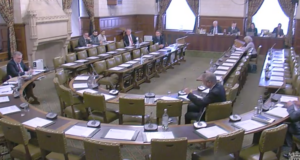The first parliamentary debate on the economic benefits of the UK medical cannabis industry was welcomed this week, but garnered a ‘predictably poor’ response from government.
A number of cross-party MPs spoke up in support of the UK’s medical cannabis industry in parliament’s first debate on its economic potential on Thursday 20 April.
However, the government response continues to illustrate a ‘lack of understanding’ of the sector and has been dubbed ‘predictably poor’ by industry experts who attended the debate.
Titled the ‘economic contribution of medical cannabis’, the debate was led by Conservative MP for Dumfriesshire, Clydesdale and Tweeddale, David Mundell and covered the issues around the domestic production of medicinal cannabis, the CBD industry and the barriers preventing patients from accessing cannabis-based medicines on the NHS.
Cross-party support for medical cannabis industry
A number of MPs heralded the potential economic benefits of the UK’s medical cannabis industry.
Some estimates predict that a thriving sector could create over 100,000 new jobs, with the medical cannabis industry expected to reach £2.4 billion by 2024 and a domestic CBD market worth £1 billion by 2025.
In his opening speech, Mundell acknowledged that in 2021 the UK produced 329 tonnes of cannabis for medical and scientific purposes, of which 213 tonnes were exported.
“Beneath those impressive headline figures, though, is the impact that the industry can have on local economies and local communities,” said Mundell, whose constituency is home to one of the largest production facilities in the UK, owned by Hilltop Leaf.
Fellow Conservative MP, Jeremy Wright added: “It simply makes no sense to create a demand and then refuse to allow our domestic producers to meet it, and instead to import all the products.
“Doing that is not just a wasted economic opportunity, but has a direct healthcare effect.”
There were numerous calls for a review of the current regulations and the rescheduling of cannabis to help overcome some of the complex and costly challenges in the current licensing process. The suggestion of a government-appointed senior official to engage directly with the industry was also made.
However, with no Home Office ministers present, the task of responding fell to the Minister for Health and Secondary Care, Will Quince and focused largely on the barriers preventing NHS access.

The debate took place in Westminster Hall on Thursday 20 April. Credit: UK Parliament
First details of NHS trials
The Health Minister used the debate as an opportunity to announce the first details of upcoming NHS randomised control trials (RCTs) on CBD and THC products in adults and children with drug-resistant epilepsy.
The trials will be undertaken by researchers at University College London, with a tender opportunity for commercial partners wishing to supply the products for these trials expected to launch ‘in the next few weeks’ in order to commence ‘as soon as possible’.
Long-time medical cannabis advocate, SNP MP Ronnie Cowan, highlighted that many parents – particularly those with children already being successfully treated with cannabis products – would be reluctant to enter their child into a RCT due to the risk of them being given a placebo.
“I have three kids and two grandkids. If one of them was suffering from intractable epilepsy and I had them on Bedrocan, and they were either seizure-free or had the condition under control, I would not want to hand them over to a random control test where they might be fed a placebo and therefore incur more damage,” he said. “Would the Minister?
Quince responded: “That is a difficult question to answer.”
Incorrect claims around unlicensed medicines
The Health Minister has also been pulled up on his incorrect statements around the need for medicines to be licensed ‘for use and prescription in the NHS’.
“This is simply wrong,” said campaigner and director of Maple Tree Consultants, Hannah Deacon, who attended and helped secure the debate.
“Many medications that are prescribed – especially for children with epilepsy – are lacking safety evidence and are unlicensed or prescribed off-label. The very nature of refractory epilepsy is that children are diagnosed very young and the conditions are very rare. The ability to undertake trials ethically in children with these conditions is very difficult, hence why they’re not done.”
Data from the NHS Business Service Authority – highlighted by Alice Salisbury, parent to a child with a rare form of epilepsy – shows that over 30,000 prescriptions for ‘specials’ or unlicensed medicines are written each month, according to equating to around £4.5million per month.
Perhaps @willquince would like to make his argument that unlicensed medications shouldn’t be prescribed on the NHS to the UK Pharma Industry and see how it goes down. Because at the moment about 30k special prescriptions are written/month… pic.twitter.com/3YUVNEbZ2M
— Alice Salisbury (@alicesalisburyj) April 21, 2023
“It feels as though the government is, either unintentionally or actively, blocking access for very sick children through this requirement for RCTs,” continued Deacon.
“Their approach feels very outdated. Cannabis is best researched through observational data and real-world evidence, by the very nature of the people that you are treating and the way that the medicine works.”
Ministers must engage with the wider industry
Quince referenced Jazz Pharmaceuticals (formerly GW Pharmaceuticals), the producer of licensed cannabis-based medicines Epidyolex and Sativex, several times during the debate, revealing that he visited one of its sites to ‘learn more about the industry’.
Chair of the Cannabis Industry Council, Professor Mike Barnes, posited that this was ‘further evidence of aggressive lobbying’ on behalf of Jazz Pharmaceuticals.
Meanwhile, Deacon urged him to engage with others in the sector.
“It is great to see that he is engaging with this particular company, but I think it is extremely important that he also engages with the rest of the industry,” she said.
“There are many others in the sector that could be and should be working with the government to help roll out this medication to the many millions of people in the country who need it.”

Hannah Deacon, director of Maple Tree Consultants
A ‘poor response’ demonstrating the government’s ‘lack of understanding’
While the fact that the debate happened at all is some sign of progress towards acceptance of medical cannabis among MPs, most believe that Quince missed the point on the majority of questions put to him.
Speaking to Cannabis Health, both Deacon and Professor Barnes criticised the ‘poor response’ and ‘lack of understanding’.
“The fact that parliamentarians are discussing the potential of our sector and the action needed to become a world leader is really encouraging,” said Deacon.
“Whilst it was great to see that debate happen and I would like to thank the MPs who spoke and made it really clear why patient access in the industry is so important, I was saddened to hear that Will Quince’s response was so lacking in understanding.”
Professor Barnes added: “The fact that the debate took place is welcome, but the response from the Health Minister was predictably poor, with a clear lack of understanding of the problems of conducting classic RCTs trials on something which is not a pharmaceutical medicine.
“He continued to speak about the concerns over the safety of cannabis-based medicines, ignoring that cannabis is the most used drug in the world, having been used for thousands of years. Predictable nonsense.”
The full transcript from the debate is available via Hansard.
- “A total failure of government policy” – Medical cannabis to be discussed in Parliament
- Is the government finally recognising the potential of a medicinal cannabis industry?
- Romania to host international debate on medicinal cannabis
- Cannabis linked to positive public health outcomes – why the UK government should take note
- Landmark UK trials to study cannabis-based medicine in complex pain conditions
The post MPs debate economic benefits of medical cannabis – key takeaways appeared first on Cannabis Health News.
Go to Source
Author: Sarah Sinclair

